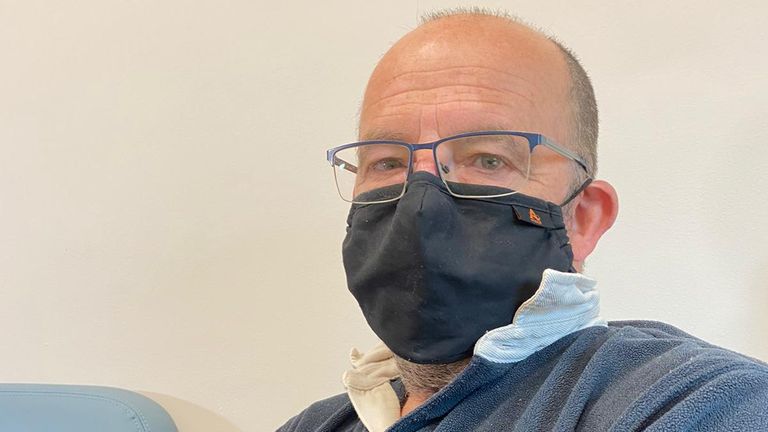[ad_1]
They are, rightly, very proud of their EG Starguide Nuclear medicine system here at the South West Wales Cancer Centre.
The state-of-the-art scanner will allow this centre to double the number of patients it sees.
Mark Boulter is one of these patients. The retired GP was diagnosed with stage 2 rectal cancer six weeks ago.
“So people have worked really, really hard to get me to here,” he tells me.
“That has taken probably taken about 10 weeks but now I’m having radiotherapy and the clinics have looked pretty full.
“But also things are running 40, 50, 60 minutes behind schedule and people are being really nice and they’re coming out and apologising for the delays but you can see the staff are stressed by it.”
A £4m investment in the centre will certainly help in relieving some of the pressure the system is under. But Wales, like the rest of the country, is desperately struggling with severe workforce shortages.
Dr Victoria Trainer is a Consultant Radiologist. She tells me she had a wobble last year. After two years of a gruelling pandemic, a relentless workload and the stress of trying to tackle a growing cancer waiting list threatened to become too much.
But she has stayed in the job she loves. Other doctors have decided enough is enough and are leaving the profession.
That adds to the workforce crisis gripping the NHS right now.
“There’s a 29% shortfall of consultant radiologists in the UK,” Dr Trainer explains.
“That doesn’t mean a lot until you say well that’s actually a shortage of 1,621 consultants just for the UK, which shows the gravity of the situation.”
I ask Dr Trainer how these vacancies impact cancer waiting times.
She replies: “Well, one of the results could be that you have a delay in the waiting times and a delay in the cancer outcomes.”
A delay in the cancer outcomes means cancer patients are more likely to get very sick or even die.
Every month of delayed cancer treatment raises the risk of death by 10%.
But it is not just radiologists. There is an acute shortage of oncologists too: cancer medics like Dr Russell Banner who are working flat out and burning out in the process.
“We find ourselves putting on extra clinics, overbooking our clinics and working long hours and over our intended hours. We pride ourselves on providing great care.
“We’re worried that we will not be able to continue that in the face of growing pressures without the sustainable workforce plans we need.”
And ultimately that is the real issue. The impact workforce shortages are having on patient care.
The pressures in cancer care existed before the pandemic but the global health crisis has made things much worse.
The United Kingdom was already one of the worst-performing countries in Europe for cancer care. But now it is feared some 50,000 cancer diagnoses might have been missed during the COVID emergency.
The Government says it has a 10-year cancer plan, but the warning is that the NHS staffing crisis will get much worse.
And we know that with cancer every day matters.
[ad_2]









